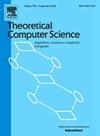Privacy enhanced secure compact attribute-based signature from MQ problem for monotone span program
IF 0.9
4区 计算机科学
Q3 COMPUTER SCIENCE, THEORY & METHODS
引用次数: 0
Abstract
The rapid advancement of computer networks has led to an increase in the exposure of messages within an open environment (cloud). Therefore, the confidentiality of the user's signing information is extremely essential to handle unauthorized access and alterations. Attribute-based signature (ABS) scheme is a significant primitive that ensures the privacy of the user's signing information. To endorse a message, the signer can generate a signature with his/her attributes that satisfy a policy without revealing any other information. Post-quantum attribute-based signature schemes are attractive construction options whose safety do not collapse in presence of quantum computers. This article presents the first attribute-based signature scheme in multivariate quadratic (MQ) setting. To generate the secret signing key, the salted-UOV technique is employed in our protocol. While signing, the well-known 3-pass identification protocol is coupled with the Fiat-Shamir transformation. More positively, our candidate relies on presenting the policy as a monotone span program. We also study existential unforgeability and the perfect privacy feature which ensures that a signature cannot be linked to any signing information. Moreover, our scheme is compact in the sense that it performs efficiently in terms of storage when contrasted to the existing post-quantum attribute-based signature schemes.
基于单调跨度程序 MQ 问题的隐私增强型安全紧凑属性签名
计算机网络的快速发展导致信息在开放环境(云)中的曝光率增加。因此,用户签名信息的保密性对于处理未经授权的访问和篡改至关重要。基于属性的签名(ABS)方案是确保用户签名信息私密性的重要基础。要认可一条信息,签名者可以用他/她的属性生成一个符合策略的签名,而不会泄露任何其他信息。后量子属性签名方案是一种极具吸引力的构建方案,其安全性在量子计算机面前不会崩溃。本文提出了首个多变量二次方(MQ)环境下基于属性的签名方案。为了生成秘密签名密钥,我们的协议采用了加盐-UOV 技术。在签名时,著名的三重识别协议与 Fiat-Shamir 变换相结合。更积极的是,我们的候选方案依赖于将策略呈现为单调跨度程序。我们还研究了存在的不可伪造性和完美的隐私特性,确保签名不能与任何签名信息相关联。此外,与现有的基于后量子属性的签名方案相比,我们的方案结构紧凑,存储效率高。
本文章由计算机程序翻译,如有差异,请以英文原文为准。
求助全文
约1分钟内获得全文
求助全文
来源期刊

Theoretical Computer Science
工程技术-计算机:理论方法
CiteScore
2.60
自引率
18.20%
发文量
471
审稿时长
12.6 months
期刊介绍:
Theoretical Computer Science is mathematical and abstract in spirit, but it derives its motivation from practical and everyday computation. Its aim is to understand the nature of computation and, as a consequence of this understanding, provide more efficient methodologies. All papers introducing or studying mathematical, logic and formal concepts and methods are welcome, provided that their motivation is clearly drawn from the field of computing.
 求助内容:
求助内容: 应助结果提醒方式:
应助结果提醒方式:


